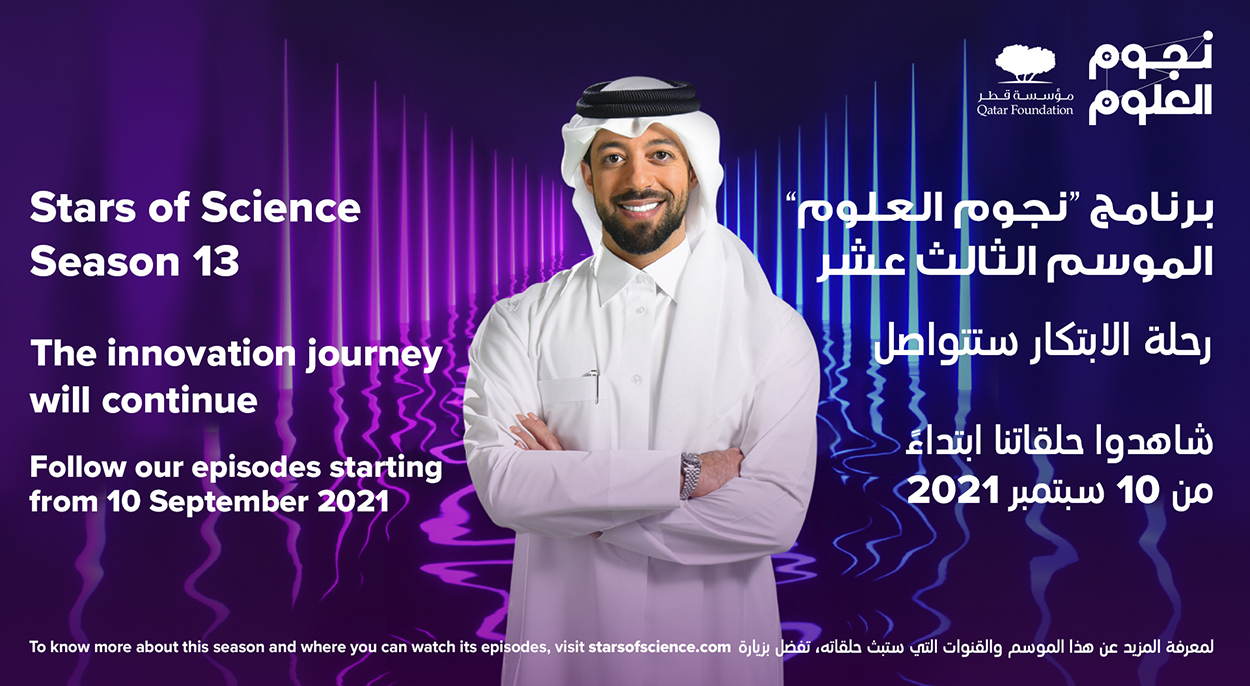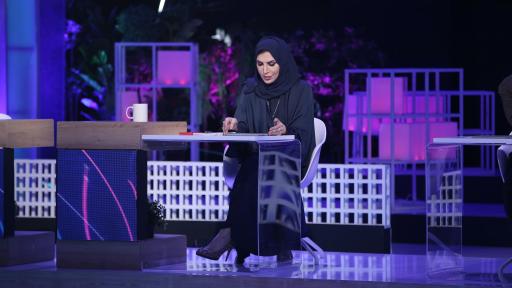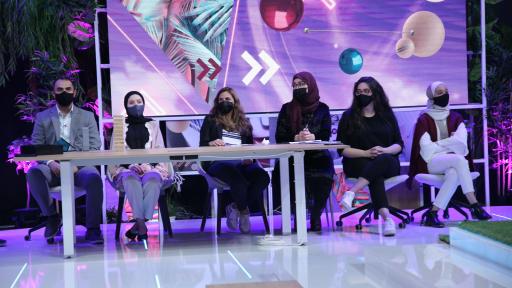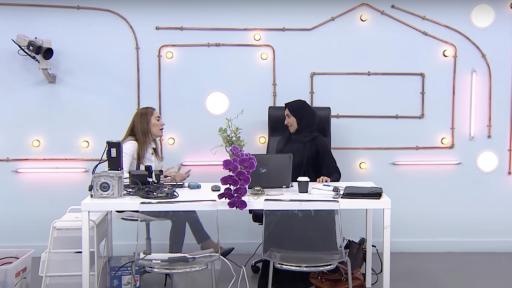Stars of Science, the Qatar Foundation TV edutainment initiative, gives Arab women the chance to pursue their ambitions in scientific excellence
Stars of Science, the Qatar Foundation TV edutainment initiative, gives Arab women the chance to pursue their ambitions in scientific excellence
OPPORTUNITIES MUST FOLLOW FOR ARAB WOMEN WHO ARE INCREASINGLY PURSUING STEM EDUCATION
Doha, Qatar, September 18, 2021: In higher education institutions throughout the Arab world, there exists a significant gender gap among the student population – one that favors Arab women.
According to The Arab Gender Gap Report 2020 published by the United Nations Economic and Social Commission for Western Asia (ESCWA), a higher percentage of women are enrolled in higher education programs compared to the percentage of men at the standard tertiary age, in most Arab countries. The greatest gender gap can be observed in Qatar, where enrollment statistics favored women with 47 percent compared to 6 percent of men in higher education programs in 2016.
Arab women are not just pursuing degrees; they are pursuing education in scientific fields and at an increasing rate too. The report also detailed that there were in the United Arab Emirates and Kuwait four times more female graduates than male graduates in science-related disciplines.
According to Dr. Buthaina Al Ansari, Strategic planning and Human Development Expert and jury member on Stars of Science season 13, these high rates of Arab women in the STEM fields underline their long-standing commitment to the region’s development. “Many of us are now encouraged to pursue our scientific aspirations, but our drive to improve the lives of those around us and add to the region’s wealth of knowledge have always been present,” she said.
Jury member Dr. Al Ansari knows the importance of empowering Arab women looking to contribute to their communities. She previously served as a member on the boards of the Arab International Women’s Forum and the Qatari Businesswomen Forum.
Dr. Al Ansari’s commitment to supporting Arab women earned her recognition throughout the region where she was listed among the most Powerful Arab Women and was named Businesswoman of the Year 2011.
However, this uptick in female engagement with STEM education has not yet been translated in greater representation in the workforce. According to the UNESCO Science Report 2021, four Arab countries – Algeria, Egypt, Kuwait, and Tunisia – have achieved gender parity in the number of scientific researchers across all disciplines, with at least 45 percent of researchers being women. In the fields of engineering and technology alone, Kuwait managed to achieve parity; approximately 47 percent of researchers were women.
Engineer Sylia Khecheni, a Stars of Science alumna, is currently an Applied Research Project Manager at Ibtechar in Qatar after having worked as an R&D manager at Algerie Telecom. Sylia noted that women face multiple obstacles when it comes to finding work in these industries.
She said: “In general, jobs in the STEM-focused fields are quite limited for both Arab men and women. But men have the advantage as, for example, in Telecommunications & Networking, maintenance field jobs are the most requested and constitute a majority of the available jobs but target mainly men. It can be very difficult for a woman to find a place in these industries.
“Having more women in the field of STEM is crucial and is especially important to broaden our horizons and ensure sustainable development. We must continue to create more opportunities for women in these sectors to ensure that we are benefitting from female talent. I am optimistic about the future of women in STEM.”
Stars of Science, the Qatar Foundation TV initiative is designed to help address this issue. The show has invited Arab innovators like Khecheni from across the region to compete on the show. To date, 320 women have participated in the show’s casting across all its 13 seasons, and 29 women have competed as part of the show’s Top Eight.
Khecheni participated in Season 10 of the show, with her invention, SkyCloak, the Home Privacy Drone Blocker. This device detects commercial Wi-Fi or radio-controlled drones before jamming remote control signals and blocking any live video transmissions within a specified area. Khecheni won third place and garnered enough support to continue working on SkyCloak after her time on the show.
Along with her team, she carried on with the development of SkyCloak and has successfully reached a third version MVP prototype that has been tested on over 50 different drones manufactured by 18 different vendors. She also managed to add to their block list some drones from the Category B.
Khecheni took home the grand prize and special recognition from the jury at the 2020 International Invention Fair of the Middle East, the largest specialized exhibition of inventions in the region hosting more than 60 nationalities and hundreds of inventions. Additionally, she acquired a patent for her innovation in April 2021.
“Stars of Science has always inspired Arab youth to wield their engineering and research expertise in service of their communities. Through women like Sylia, girls and women from across the region can hopefully be inspired to join the world of innovation and bring their own ideas to life,” said Dr. Al Ansari.
As more and more women continue to enter tertiary education in pursuit of degrees in the STEM fields, the region will have access to an invaluable resource of human expertise. Initiatives like Stars of Science are important to ensuring that Arab women will continue to have opportunities as engineers, scientists, researchers, and more.
Watch the new Season 13 of Stars of Science on seven TV channels in the region and online, every Friday and Saturday starting from September 10 to October 22, where Professor Fouad Mrad – an expert on technology and innovation in the Arab world – will preside over a new crop of Arab innovators alongside new jury members Dr. Buthaina Al Ansari, an accomplished Qatari businesswoman, and Associate Professor Dr. Walid Albanna, winner of the show’s Season 10.
For a full broadcast guide to Stars of Science Season 13 and to apply to Season 14, visit www.starsofscience.com
About Stars of Science
As the premier innovation show in the Arab world, Stars of Science – the edutainment TV initiative of Qatar Foundation (QF) – empowers Arab innovators to develop technological solutions for their communities aiming to improve people’s well-being, provide financial opportunities to their local citizens, and advance sustainable development.
Over a 12-week process, the contestants demonstrate the effectiveness of their solutions in a shared innovation space, competing against time with the support of a team of experienced engineers and product developers.
An expert panel of jurors assess and eliminate innovators and their projects every week across several prototyping and testing rounds, until only four finalists remain to compete for a share of $600,000 (terms and conditions apply). Jury deliberation and online voting from the public determine the rankings.
Stars of Science will air every Friday and Saturday on TV and online, from September 10th, 2021 till October 22nd, 2021. Please visit the broadcast guide for channels and timings: starsofscience.com
Apply to be on Stars of Science Season 14 to become the next innovator, visit www.starsofscience.info
Please visit:
Qatar Foundation – Unlocking Human Potential
Qatar Foundation for Education, Science and Community Development (QF) is a non-profit organization that supports Qatar on its journey to becoming a diversified and sustainable economy. QF strives to serve the people of Qatar and beyond by providing specialized programs across its innovation-focused ecosystem of education, research and development, and community development.
QF was founded in 1995 by His Highness Sheikh Hamad bin Khalifa Al Thani, the Father Amir, and Her Highness Sheikha Moza bint Nasser, who shared the vision to provide Qatar with quality education. Today, QF’s world-class education system offers lifelong learning opportunities to community members as young as six months through to doctoral level, enabling graduates to thrive in a global environment and contribute to the nation’s development.
QF is also creating a multidisciplinary innovation hub in Qatar, where homegrown researchers are working to address local and global challenges. By promoting a culture of lifelong learning and fostering social engagement through programs that embody Qatari culture, QF is committed to empowering the local community and contributing to a better world for all.
For a complete list of QF’s initiatives and projects, please visit: www.qf.org.qa
For any media inquiries, please contact: [email protected]
For more information, please contact:
Salma Sadek –Weber Shandwick
[email protected]
+974 3398 8390








